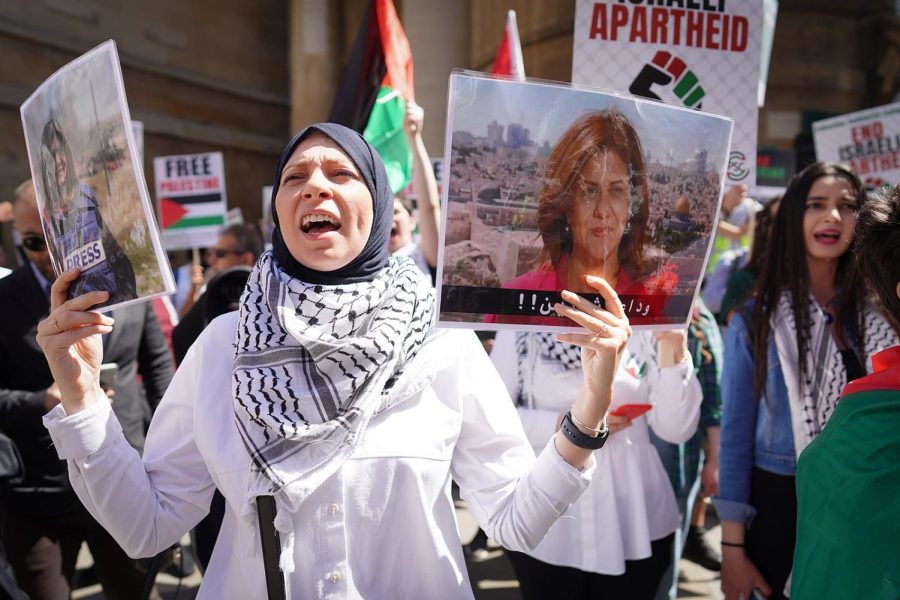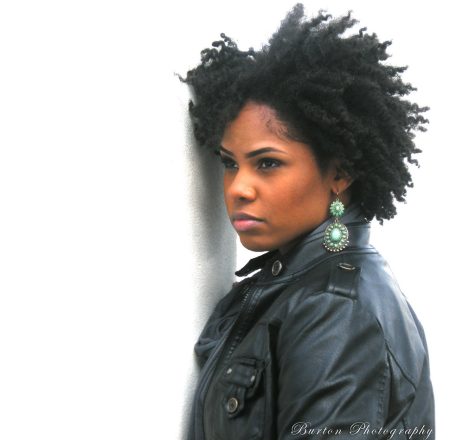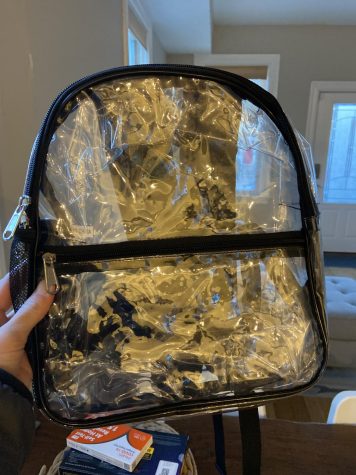Opinion: Journalists targeted in Palestine a warning to global community
Demonstrators on May 14 in London, protesting the death of Shireen Abu Akleh
Sounds of gunshots reverberate in the background. The shouts of a man can be heard. “Shireen’s hurt!” The body of a woman is seen slumped against the ground. The word PRESS is stark against her blue vest and those of her companions as they attempt to carry her to safety. An ambulance takes her to the nearest hospital where she is pronounced dead. The cause of death: a gunshot wound to the head.
Palestinian journalist Shireen Abu Akleh was killed the morning of May 11 while reporting for the news broadcast Al-Jazeera. Millions around the world have been mourning her death and the legacy she left behind as an investigative and on-ground reporter of Palestinian living conditions under Israeli occupation. According to Al-Jazeera, she was reporting on an Israeli raid in the Palestinian city of Jenin. Shots had been exchanged between sides; however, it was clear that she and her companions were journalists with press vests and helmets worn the entire time. They should have been safe from the line of fire, yet Shireen and another journalist, Ali Al-Samoudi, were targeted and injured.
The source of the shots has been pinned on both sides, with Isreal blaming Palestinian militants and Palestine blaming Israeli Defense Forces (IDF). However, further reports from Al-Jazeera say that the journalists accompanying Abu Akleh, including Al-Samoudi who survived his injury, said that there were no Palestinian fighters seen where they were situated, and there had been no confrontations between sides at the time.
In an investigation conducted by CNN, the videos recorded of the event support these claims of the eyewitnesses, and evidence found by forensics and explosive weapons experts suggest that the attack was targeted and committed by Israeli forces. However, until a legal investigation can be conducted, nothing can be confirmed. Israeli top lawyer, Major General Yifat Tomer-Yerushalmi, says that according to their military policy, no investigation is required if death is committed in an “active combat zone” unless there are clear suspicions of criminal activity. As a response, the international community has called for an independent investigation.
Protection of journalists during times of active combat or war is legally required through international law under the Geneva Conventions. In these treaties, journalists are given the same protection as civilians in active combat, and in the case of a world-famous journalist like Abu-Akleh, the push for the protection of journalism and the press is stronger than ever.
This is not the first time Israel has come under fire for targeting journalists. Last year, during an 11-day consecutive attack on the Palestinian city of Gaza, Israel bombed the media building of Al Jazeera and Associated Press (AP). They gave all journalists and workers an hour to evacuate before sending three missiles to level the building. Israel claimed the attack was to target Palestinian militants of the group Hamas, who they said were being housed within the building. The president of AP refuted this and said they had no knowledge or found any evidence of Hamas members in the building. Nevertheless, Israel received no repercussions for the attack, and journalists have had to shoulder the reality of their job becoming more and more dangerous.
Reporting news is essential to get out information on vital events, but if the security of the lives of journalists is at stake, fewer reports will be put out and accessible for citizens to be educated on their communities. Israel’s refusal to investigate the truth of Abu Akleh’s death being delayed demonstrates a dangerous precedent for the future of journalism not only in places like Palestine but the entire globe. It’s up to the international community to uphold freedom of the press by holding Israel accountable for the potential actions of their military and help put the rumors surrounding Shireen Abu Akleh’s death to rest.









